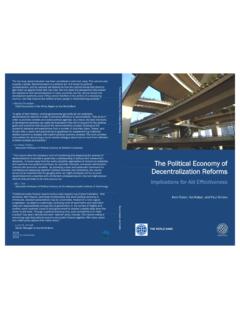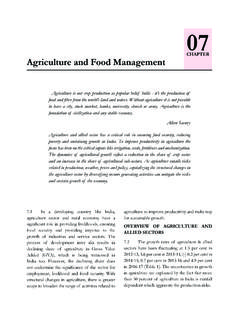Transcription of DOES LIBERTE` EGALITE´? A SURVEY OF THE EMPIRICAL LINKS ...
1 DOES LIBERTE` EGALITE ? A SURVEY OF. THE EMPIRICAL LINKS between . democracy AND inequality with . SOME EVIDENCE ON THE TRANSITION. ECONOMIES. Mark Gradstein Ben Gurion University Branko Milanovic The World Bank Abstract. The effect of the distribution of political rights on income inequality has been studied both theoretically and empirically. This paper reviews the existing literature and, in particular, the available EMPIRICAL evidence. Our reading of the literature suggests that formal exclusion from the political process through restrictions on the voting franchise appears to have caused a high degree of economic inequality , and democratization in the form of franchise expansion especially for women, has more often than not led to an expansion in redistribu- tion, at least in the small sample of episodes studied. In a less pronounced way, albeit more emphatically compared to the ambiguous results of the earlier research, the recent evidence indicates an inverse relationship between other measures of democracy , based on civil liberties and political rights, and inequal- ity.
2 The transition experience of the East European countries, however, seems to some extent to go against these conclusions. This, in turn, opens possible new vistas for research, namely the need to incorporate the length of democratic experience and the role played by ideology and social values. Keywords. democracy ; Freedom; inequality ; Redistribution 1. Introduction The relationship between political structure and economic performance has long been a subject of scrutiny for researchers. In particular, the LINKS between the extent to which an economy is democratized and its income growth and income distribu- tion have been examined. While the studies on the first of the above LINKS has been recently surveyed by several authors,1 the second link has received much less attention. The objective of this SURVEY is to bridge this gap by focusing on the EMPIRICAL evidence with regard to the second link , asking specifically, whether or not democratization should be expected to bring about a decrease in income inequality .
3 0950-0804/04/04 0515 23 JOURNAL OF ECONOMIC SURVEYS Vol. 18, No. 4. # Blackwell Publishing Ltd. 2004, 9600 Garsington Road, Oxford OX4 2DQ, UK and 350 Main St., Malden, MA 02148, USA. 516 GRADSTEIN AND MILANOVIC. We need to be very precise about the relationship which we propose to SURVEY here. First, on the inequality side, we are concerned only with within-nation inequality . The subjects of the between -nation inequality (as examined in Firebaugh (2000) for example) or global inequality of individuals in the world (Milanovic, 2002) are outside the scope of this paper. Second, on the democracy side, we are interested in the effects of democratization, conventionally under- stood to include greater public say in the affairs of the state through free and fair election of various government official, freedom of speech, public assembly, formation of political parties and the like. The implication is that our attention will be focused on a relatively narrow range of democracy measures.
4 A broader perspective would address the LINKS between quality of governance and political instability on the one hand and inequality on the other hand. We are not pursuing this broader scope presently for two reasons. For once, quality of governance or political instability are conceptually different from democracy : they address polit- ical performance of a system, not its inherent (democratic or not) For obviously a given level of democracy can coexist with vastly various levels of political stability and transparency of The second reason is that the EMPIRICAL literature that studies the effects of governmental quality on inequality is still very scarce. Finally, this work focuses on the causal link from democracy to inequality only touching in passing the issue of the reverse causality. That political factors play an important role in shaping inequality should not come as much of a surprise. While economic theory has much to say about efficiency in the allocation of resources, as described by the Pareto frontier, it is much less eloquent about the precise point(s) on the frontier likely to be reached in reality, claiming that this depends on normative/political considerations.
5 The recent political economy literature tries to tackle this latter issue by specifying the institu- tional details of the political process, which resolve distributional conflicts ( , Meltzer and Richard, 1981; Alesina and Rodrik, 1994; Persson and Tabellini;. 1994). In particular, a subset of this literature, surveyed in greater detail below, deals specifically with the relationship between the distribution of political power and the distribution of economic resources, which is the focus of this SURVEY . It might be tempting to think that a more equal distribution of political power, that is more democracy , would necessarily imply less economic inequality . How- ever, a cursory review of the recent development history in countries of East Asia and East Europe, reveals this intuition to be misleading. In fact, some East Asian countries, such as Taiwan and South Korea, have achieved a relatively equal distribution of income when autocratic regimes prevailed, and, ironically, in the post communist countries of East Europe, inequality seems to have actually increased during the course of democratization.
6 These examples call for a more formal EMPIRICAL look at the co-evolution of democratization and inequality across countries. Indeed, the EMPIRICAL research of the subject has been vibrant in recent years. The issue being of an inherently interdisciplinary nature has been addressed by sociologists, political scientists, and economists. The early research conducted in the sixties and seventies made evident the methodological issues that have to be # Blackwell Publishing Ltd. 2004. DOES LIBERTE` EGALITE ? 517. faced by researchers in the field, such as measurement problems, sample compos- ition, model specification and others. More recently, measurement of some key variables (particularly of inequality , but also of democracy ) has been significantly refined, which has allowed for a better reassessment of the evidence. Our main purpose is to briefly review the theories that have been developed on the relationship between democracy and inequality and, in particular, to summarize the results of the EMPIRICAL research.
7 Since the early EMPIRICAL studies of the sixties and seventies, have been comprehensively surveyed elsewhere (Sirowy and Inkeles, 1990) the present coverage focuses on the more recent evidence. We also make an attempt to more explicitly relate the findings to existing political economic models. The SURVEY proceeds in the following order. The next section sketches some theories on the relationship between democracy and inequality . Section 3 then discusses some methodological issues associated with EMPIRICAL tests of these theories. Section 4 reviews the EMPIRICAL evidence, while section 5 pays closer attention to the recent transition process in the post communist countries of East Europe. Finally, concluding remarks are presented in section 6. 2. Outline of the Theoretical Arguments Economists and social thinkers have long held that by reducing inequalities in the distribution of political power, democracy helps to reduce inequalities of wealth and The view that political democracy leads to greater economic equality was commonly held in the late eighteenth- and early nineteenth-century period, and economic consequences of democracy have been at the center of debates concerning the right to vote and to organize during the first half of the nineteenth century.
8 One of the main arguments has been that democracy , specifically universal suffrage and the freedom to form unions, threatens private property: endowed with political power in the form of universal suffrage, those who suffer as a consequence of private property will attempt to use this power to expropriate the rich. The British electoral reforms, in particular reduction of the suffrage in the wake of the French revolution, are generally the best-known, and the most researched, case. But the same problems were present throughout Europe: only some 10% of adult male Italians, Dutch and Belgians had the right of vote as late as 1880 (Flora et al., 1983; Lindert, 1989); less than 2% of adult males were enfranchised in Hungary on the eve of World War I (Taylor, 1967; Polonsky, 1975, p. 46). The dilemma was eloquently summarized in 1871 by the Spanish statesman Canavas del Castillo in a rebuttal to those who complained about electoral fraud.
9 He wrote: to have to choose between the permanent falsification of universal suffrage and its abolition is not to have to choose between universal suffrage and preservation of property'. (Ubieto et al., 1972, p. 731). In modern times, the theoretical case on the link between democracy and inequality has been forcefully presented by Lipset (1959) and Lenski (1966). Lipset argued that democratic political structures lead to elections that serve as the expression of the democratic class struggle. Citizens vote for parties that appeal primarily to either working-class or middle-class interests. The extension # Blackwell Publishing Ltd. 2004. 518. # Blackwell Publishing Ltd. 2004. Table 1. Regressing inequality on democracy : Transition Countries. Gini change Gini post-transition level Cumulative liberalization ( ) ( ) ( ) ( ). GDP 1988 (in $PPP) x 1000 ( ) ( ) ( ) ( ). CIS dummy ** ( ) * ( ). Constant ** ( ) ( ) ** ( ) * ( ).
10 R2 adjusted (F) Number of observations 21 21 21 21. Note: t-values between brackets. * significant at 5%. ** significant at 1%. GRADSTEIN AND MILANOVIC. DOES LIBERTE` EGALITE ? 519. of the franchise since the last century to include those with little property and other assets has vastly increased political competition in industrial societies, and has served to move politics toward the left. Similarly, for Lenski, the new democratic ideology' legitimates a major redistribution of political power in favor of the majority namely, the disadvantaged elements of society. This increased political equality has led to more social equality because the major electoral demand made on modern political elites has been for a more egalitarian distribution of material goods. The construct of Meltzer and Richard (1981, 1983) is the economists' counter- part of the above argument. They exhibit a formal pure redistribution model, whereby taxes, which are proportional to income, are used to provide a lump-sum payment.















